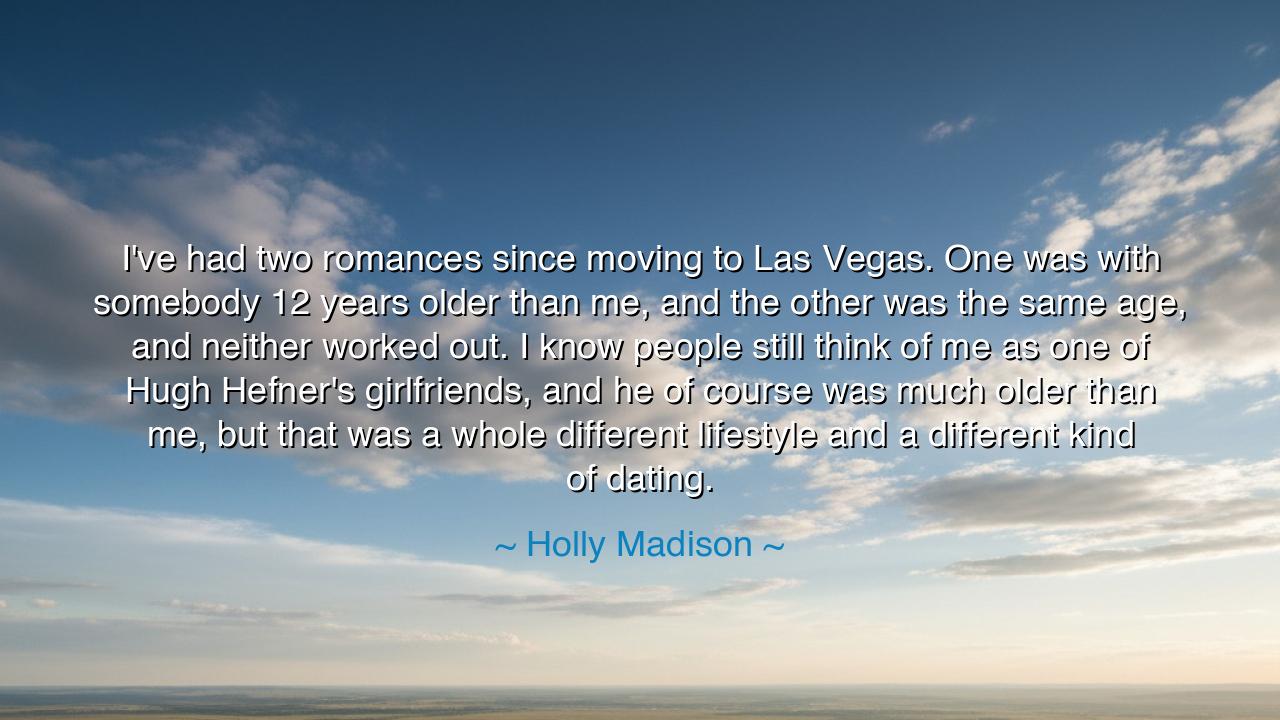
I've had two romances since moving to Las Vegas. One was with
I've had two romances since moving to Las Vegas. One was with somebody 12 years older than me, and the other was the same age, and neither worked out. I know people still think of me as one of Hugh Hefner's girlfriends, and he of course was much older than me, but that was a whole different lifestyle and a different kind of dating.






“I’ve had two romances since moving to Las Vegas. One was with somebody 12 years older than me, and the other was the same age, and neither worked out. I know people still think of me as one of Hugh Hefner’s girlfriends, and he of course was much older than me, but that was a whole different lifestyle and a different kind of dating.” Thus spoke Holly Madison, whose life has unfolded under the unrelenting gaze of the public eye. Yet beneath her words lies a truth older than fame itself — the truth that love, though sought in many forms and through many ages, is never guaranteed by circumstance. Her reflection speaks not merely of romance but of identity, growth, and the search for something real in a world that often confuses affection with appearance.
When she speaks of love — of two romances, of one “older” and one “the same age” — she is not recounting gossip but describing the timeless struggle of the human heart to find connection beyond illusion. Las Vegas, a city built upon light and spectacle, becomes a fitting stage for this lesson: a place where everything gleams, yet not all that shines is gold. Her words remind us that love cannot be measured by years, nor bound by the shadows of past relationships. Whether younger or older, love falters when it lacks truth. It is not time that divides two souls, but authenticity, the courage to be seen as one truly is.
She also confronts the lingering shadow of reputation — the way the world often traps a person within a single story. “People still think of me as one of Hugh Hefner’s girlfriends,” she says, and in that sentence lies the weariness of those who wish to be known for more than the role they once played. The ancients, too, understood the tyranny of image. The Greek philosopher Diogenes once walked through the city with a lamp, saying he sought an honest man; today, many walk beneath harsher lights, still seeking honesty — in others, and in themselves. Holly Madison’s lament is the modern echo of this pursuit. She reminds us that identity is not fixed; a soul grows, evolves, and must not be imprisoned by the memories of others.
Her mention of Hugh Hefner, the elder figure who once shaped her world, adds another layer to her truth. She speaks of him not with scorn, but with the calm understanding of one who has stepped beyond illusion. “That was a different lifestyle,” she says — and in those few words, one hears the tone of awakening. To her, that time was not love as most know it, but a life within a grand illusion — a world of power, beauty, and control masquerading as romance. Like the myth of Circe and Odysseus, where pleasure and captivity are intertwined, it teaches that not all forms of affection are rooted in freedom. To find real love, one must first leave behind the gilded cage.
This quote, in its quiet honesty, speaks to the evolution of the heart. Holly’s journey mirrors that of many who awaken from the dream of dependency to the dawn of self-awareness. The ancients would call this the path of psyche — the soul’s struggle to define itself. For as long as love is sought to fill emptiness, it will fail; but when it is sought to share wholeness, it may endure. Madison’s voice, reflective and unguarded, becomes that of the seeker who has lived through both illusion and awakening, and now understands that the truest relationship is the one built upon mutual respect and freedom.
Consider the story of Eurydice and Orpheus, the lovers of legend. Orpheus, in his desperation, turned back too soon, and lost her forever. His tragedy was not his love, but his lack of faith. Holly’s reflection, too, reveals this quiet truth: love falters when it is shadowed by fear, when one seeks control or approval instead of trust. Whether older or younger, richer or poorer, love cannot flourish where the heart is not free. And so she learned — as we all must learn — that the measure of love lies not in passion alone, but in the liberation of the soul.
Thus, the teaching within her words is clear: Do not seek love merely to escape loneliness or to fit the world’s story of who you are. Seek it to expand yourself, to share your strength, not to lose it. Break away from the weight of the past, from the names and roles others have given you. Love bravely, but wisely. If a relationship confines your spirit, it is not love, but illusion. And if others define you by your past, remember that identity, like the desert sands of Las Vegas, shifts beneath the winds of growth.
So, dear listener, take this wisdom from Holly Madison’s reflection: do not fear the ending of false loves, nor the judgment of those who remember only your yesterdays. Every soul must pass through illusions to discover truth. Love will come and go, but self-understanding — that sacred flame — endures. Cherish the lessons each romance brings, but let none define you. For the truest love begins only when you have claimed your own name, your own life, and your own light.






AAdministratorAdministrator
Welcome, honored guests. Please leave a comment, we will respond soon